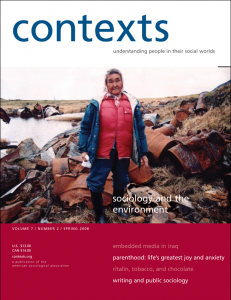
Spring 2008
Volume: 7 | Number: 2
In this issue authors also explore the effect of the Pentagon’s embedded media program on coverage of the Iraq War, whether parenthood really does make you happier, and the first generation to attend college while using (and abusing) Ritalin.
Feeling Around the World
One thing I know is that feelings are social. Joy, sadness, anger, elation, jealousy, envy, despair, anguish, grief—all these feelings are partly social. Read More
Crowd
Crowd is a scientifically useless concept because “the crowd” implies a single entity whose members have the same motives and/or continuously engage in the same … Read More
Democracy and Development in the Global South
To help make sense of some big-picture social changes in a rapidly globalizing world, Contexts invited three knowledgeable sociological critics to discuss democracy and development … Read More
The Greenwashing of America
Jarring statistics point out what little impact recyclers and low-carbon pledgers among us are having on saving the environment. Mass media accounts of corporate “greening” … Read More
The Prescription of a New Generation
Psychostimulant use in conjunction with attention deficit/hyperactivity disorder raises important questions among today’s college students about health, fairness, and the development of a person’s identity, … Read More
The Joys of Parenthood, Reconsidered
Sociologists find that as a group, parents in the United States experience depression and emotional distress more often than their childless adult counterparts. Parents of … Read More
Controlling the Media in Iraq
As an online special, we’re making this article available in its entirety. You may choose to read either the html version or a PDF … Read More
An Ounce of Precaution
Studies conducted in small communities around the globe often conclude elevated rates of cancer and other diseases are “not substantiated.” When residents in communities like … Read More
The Sociologists' Take on the Environment
A common mantra when it comes to studying the environment is that only a disinterested, dispassionate natural scientist can untangle the natural from the social … Read More
Fixing the Bungled U.S. Environmental Movement
What do recent legislative defeats say about the state of environmentalism in the United States? And where does the U.S. environmental movement stand on it? … Read More
